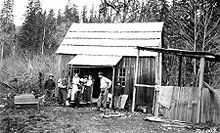Tulalip
 Tulalip tribal flag | |
| Total population | |
|---|---|
| 2,500–2,800 enrolled members[1][2] | |
| Regions with significant populations | |
|
| |
| Languages | |
| English, Lushootseed[1] | |
| Religion | |
| traditional tribal religion | |
| Related ethnic groups | |
| other Duwamish,[3] Snohomish, Snoqualmie, Skagit, Suiattle, Samish, and Stillaguamish people[1] |
The Tulalip Tribes of Washington, formerly known as the Tulalip Tribes of the Tulalip Reservation, is a federally recognized tribe of Duwamish,[3] Snohomish, Snoqualmie, Skagit, Suiattle, Samish, and Stillaguamish people.[1] They are South and Central Coast Salish peoples of indigenous peoples of the Pacific Northwest Coast.[4] Their tribes are located in the mid-Puget Sound region of Washington.
Name
The term Tulalip comes from Snohomish and means "a bay shaped like a purse." It was used in 1855 to describe the tribes who joined together on the Tulalip Reservation.[3]
Reservation

The Tulalip Indian Reservation was established by the Treaty of Point Elliot in 1855 and by Executive Order of US President Ulysses S. Grant on 22 January 1873.[2] The reservation is 22,000-acres large and lies on Port Susan in western Snohomish County, adjacent to the western border of the city of Marysville. It has a land area of 35.3 sq mi (91.3 km², or 22,567 acres) and a 2000 census population of 9,246 persons residing within its boundaries. Its largest community is Tulalip Bay.
The Tulalip people settled onto reservation lands after signing the Point Elliott Treaty with the former Washington Territory on January 22, 1855. The reservation now comprises the western half of the Marysville-Tulalip community, separated by the later construction of Interstate 5. Marysville is an incorporated city and lies East of the freeway.
The Marysville School District serves both the reservation and the city. To accommodate a growing population, in 2008 it opened three new schools, built of prefab, modular units that operate and look like traditional construction, at its site on the reservation. This large campus is now called the Marysville Secondary Campus; it contains Heritage High School, Marysville Arts and Technology High School, and a Middle School. The two high schools share a gym and commons center.[5]
Within the reservation limits is Quil Ceda Village, a business park and municipality that provides jobs and tax income for the reservation. Situated alongside Interstate 5, it is home to the reservation's first casino, QuilCeda Creek Casino; the second, the $72 million Tulalip Resort Casino, and a $130 million associated 12-story luxury hotel. [6] In addition, the municipality has a popular 100-store outlet mall.
Communities
Government

The Tulalip Tribes are headquartered in Tulalip, Washington. The tribe is governed by a seven-member, democratically-elected General Council. The current tribal administration is as follows:
- Chairman: Melvin R. Sheldon Jr.
- Vice Chairwoman: Deborah Parker
- Treasurer: Chuck James
- Secretary: Marie Zackuse
- Boardmember: Glen Gobin
- Boardmember: Marlin Fryberg Jr.
- Boardmember: Theresa Sheldon.[7]
Enrollment to the Tulalip Tribes does not require a minimum blood quantum; however, membership is based on the 1 January 1935 Tulalip census roll and those people descended from people on that roll, whose parents were residents of the Tulalip Reservation at the time of their birth.
Language
English and Lushootseed are spoken by the tribes.[1] Lushootseed is a Central Salish language. The language is written in the Latin script and a dictionary and grammar have been published.[8]
Economic development

The Tulalip Tribes own and operate Tulalip Bingo, Quil Ceda Deli, Tulalip Casino, Canoes Carvery, Cedars Cafe, Eagles Buffet, Tulalip Bay Restaurant, Tulalip Resort Hotel and Spa, Quil Ceda Creek Nightclub and Casino, Torch Grill, and Q Burgers, all located in Tulalip, Washington.[9]
Events
The tribes host numerous annual events, including Treat Days, typically in January to commemorate the signing of the Point Elliot Treaty on 22 January 1855; Salmon Ceremony, to bless the fishermen; Winter Dancing; and a Veteran's Pow Wow during the first weekend of every June.[1]
Notes
- ↑ 1.0 1.1 1.2 1.3 1.4 1.5 "Who We Are." Tulalip Tribes. Retrieved 25 Sept 2013.
- ↑ 2.0 2.1 "Tulalip Tribe." Northwest Portland Area Indian Health Board. Retrieved 25 Sept 2013.
- ↑ 3.0 3.1 3.2 Pritzker 198
- ↑ Pritzker 203
- ↑ Christina Siderius, "Marysville schools defying the portable stereotype", Seattle Times, 2 April 2008
- ↑
- ↑ "Board of Directors." Tulalip Tribes. Retrieved 25 Sept 2013.
- ↑ "Lushootseed." Ethnologue. Retrieved 25 Sept 2013.
- ↑ "Washington Indian Casinos by Tribes." 500 Nations. Retrieved 25 Sept 2013.
References
- Pritzker, Barry M. A Native American Encyclopedia: History, Culture, and Peoples. Oxford: Oxford University Press, 2000. ISBN 978-0-19-513877-1.
External links
- Tulalip Tribes, official website
- Constitution and Bylaws for the Tulalip Tribes of Washington
- Tulalip Lushootseed, language project
Coordinates: 48°04′40″N 122°16′15″W / 48.07778°N 122.27083°W